Dental Implants
Dental implants in Coventry from as little as £64 per month
Book Your Implants Consultation
What are Dental Implants?
Dental implants offer a strong, secure and natural-looking solution for missing teeth. They are highly advanced in dental restoration and a truly modern way to fill in the gaps in your smile. Implants create a fixed new tooth root, using strong titanium posts placed into your jawbone to support a crown or bridge.
Titanium is used for dental implants as it is very well tolerated by the body. Over time, the titanium root fuses to the surrounding bone in the jaw, becoming a solid and durable foundation.
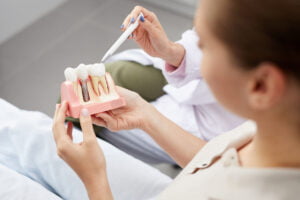
Why choose Dental Implants?
Whether you are looking to replace a single tooth or many missing teeth, we can use dental implants to provide stable and supported replacements for life. Implants allow you to regain the look, feel and function of natural teeth, without the worry that your restoration will slip or fail.
A missing tooth can significantly affect the way you eat, speak and feel. A gap can cause your facial shape to lose structure, as your gum can shrink and remaining teeth move over time. Dental implants not only restore your smile, they can greatly improve your quality of life and self-confidence. You no longer have to worry about avoiding certain foods and can feel happy about showing off your smile again.
About Dr Alexander Price
 Alex graduated from Manchester University in 2007 and completed his vocational training in Kenilworth. Following this he has worked in general practice in England as well as in Sydney, Australia. He has a keen interest in cosmetic dentistry and has completed a Postgraduate Certificate in Advanced Aesthetic Dentistry at The Eastman, University College of London. He has also completed postgraduate training in Implant Dentistry. Alex is now in his fourth year as an Educational Supervisor responsible for the training of newly qualified dentists as part of NHS West Midlands Postgraduate Dental Deanery. This position ensures that as a practice we are always up to date with the latest developments in dentistry and that Alex has had to undergo extensive interviews for the position to ensure his knowledge and experience is suitable.
Alex graduated from Manchester University in 2007 and completed his vocational training in Kenilworth. Following this he has worked in general practice in England as well as in Sydney, Australia. He has a keen interest in cosmetic dentistry and has completed a Postgraduate Certificate in Advanced Aesthetic Dentistry at The Eastman, University College of London. He has also completed postgraduate training in Implant Dentistry. Alex is now in his fourth year as an Educational Supervisor responsible for the training of newly qualified dentists as part of NHS West Midlands Postgraduate Dental Deanery. This position ensures that as a practice we are always up to date with the latest developments in dentistry and that Alex has had to undergo extensive interviews for the position to ensure his knowledge and experience is suitable.
Our dazzling Dental Implant results
What does the process for Dental Implant treatment involve?
Dental implant treatment can be quite lengthy, involving several in-surgery appointments
Step 1: Initial Consultation
During a full examination and assessment, we ensure you are a suitable implant candidate. Your treatment plan is devised and discussed in detail, including an estimated cost and timeframe.
Step 2: Planning
Using state-of-the-art digital scans and images, we precisely and accurately plan the best positions for your dental implants. Any preparatory treatment needed, such as bone grafts or extractions, is carried out.
Step 3: Fitting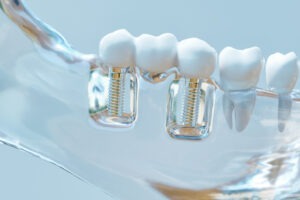
The titanium implant is placed into your jawbone by our skilled implantologist, using local anaesthetic to minimise any discomfort. The implant will take 3-6 months to heal and fuse to the bone, so a temporary tooth is fitted to protect your gum during the healing process.
Step 4: Smile!
Once your implant has fully healed and integrated, we fit your final crown or bridge and complete your brand new smile. We will give you some advice on how to look after your dental implant and leave you to start showing off your smile!
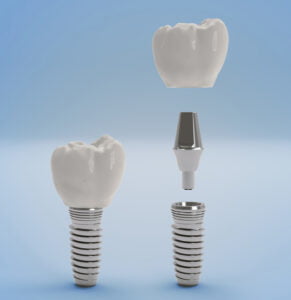
Benefits of Dental Implants
- Secure – dental implants stay firmly in place and will not slip when you are eating or speaking, or become loose over time. As they are held in place by your bone, you can be confident of their strength and durability.
- Aesthetic – implants look and feel just like natural teeth. You will be able to eat, drink and talk just as you did before, as well as show off a winning smile.
- Effective – dental implants are a well-established, safe and highly effective way of replacing one or more missing teeth in any part of your mouth.
- Supportive – implants help to support and sustain your facial structure and remaining natural teeth. They protect your gum and can be fitted with no detrimental effect on your existing healthy teeth.
- Innovative – implants use cutting edge digital dental technology combined with specialist expertise to create the next best thing to a natural tooth.
What do our clients say?
- “I have recently completed my treatment for a dental implant at Allesley Park Dental Surgery. This was a lower front tooth and not suitable for a denture although I had to have one for a time whilst the gum was being prepared. All the treatment I had was first class and when I eventually had the tooth implant it felt 100% better than the denture and nothing was too much trouble to get the correct fit and colour. I found all the staff very professional and cannot recommend them highly enough. Now I feel confident when eating and you would not know the difference between my implant and original teeth. Thank you, Alex Price.
What types of Dental Implants are available?
Single implants
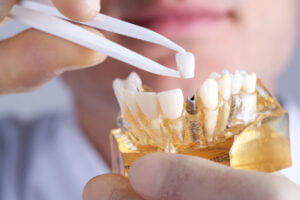 A missing tooth can be effectively replaced using a crown fitted to a single dental implant. The replacement tooth is strong, secure and durable, able to withstand pressures from chewing and look just like your existing teeth. Alternative options for a single missing tooth are available, including a single tooth denture or bridge, but these are not as effective as an implant. A single implant can be fitted with no damage to the remaining healthy teeth, prevents unwanted movement and strengthens the jaw.
A missing tooth can be effectively replaced using a crown fitted to a single dental implant. The replacement tooth is strong, secure and durable, able to withstand pressures from chewing and look just like your existing teeth. Alternative options for a single missing tooth are available, including a single tooth denture or bridge, but these are not as effective as an implant. A single implant can be fitted with no damage to the remaining healthy teeth, prevents unwanted movement and strengthens the jaw.
Multiple implants
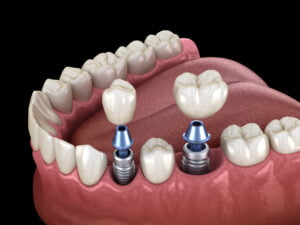 If you have several missing teeth, there are various implant options to consider to fill the gaps. Separate single implants can be placed, but you do not necessarily need an implant fitted for each missing tooth. Strategically placed implants can be used to support a bridge to replace a number of adjacent teeth. This method is particularly effective in cases where the jawbone may not be sufficient for implant treatment in some places.
If you have several missing teeth, there are various implant options to consider to fill the gaps. Separate single implants can be placed, but you do not necessarily need an implant fitted for each missing tooth. Strategically placed implants can be used to support a bridge to replace a number of adjacent teeth. This method is particularly effective in cases where the jawbone may not be sufficient for implant treatment in some places.
Full arch implants
Traditionally, dentures have been the go-to option for replacing a full upper or lower arch of missing teeth. However, despite the advances in denture treatment, they can be uncomfortable to wear and do not stop the jawbone from degrading over time. Dental implants are seen as the superior alternative and offer two main full arch options:
Fixed full arch bridge
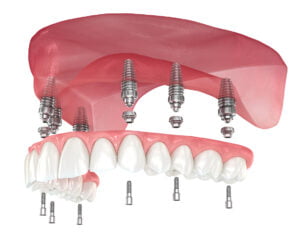 A fixed full arch bridge of new teeth, supported by four or six precisely placed dental implants. Once they have settled, your new teeth will feel completely natural and enable you to eat, drink and speak as you did before.
A fixed full arch bridge of new teeth, supported by four or six precisely placed dental implants. Once they have settled, your new teeth will feel completely natural and enable you to eat, drink and speak as you did before.
Implant-supported dentures
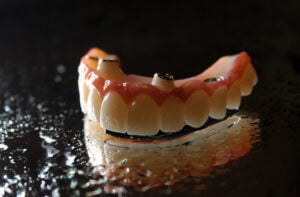 A denture, anchored into place by dental implants. Implant-supported dentures are much more secure and do not move when worn, giving you back your confidence and a full smile.
A denture, anchored into place by dental implants. Implant-supported dentures are much more secure and do not move when worn, giving you back your confidence and a full smile.
Frequently Asked Questions
- Am I suitable for dental implants?
- Most people are a suitable candidate for dental implants, as long as they are generally healthy and have good oral health. However, they are not an ideal option for everyone. Dental implants are not usually offered to younger patients whose jaws are still growing. Smokers and patients with certain medical conditions, including diabetes, may struggle to heal properly following surgery and increase the risk of implant failure. It is also important that you have enough bone density in your jaw to hold the implants in place, but this can be improved with a bone graft. We will thoroughly discuss your overall suitability for implant treatment at your initial consultation.
- Is dental implant treatment painful?
- We use local anaesthetic during dental implant surgery to ensure you are comfortable during the procedure. You won’t be able to feel a thing. After treatment, it is normal to experience some discomfort, and this can be managed with pain relief advised by your dentist. Implant treatment is often less painful than having a tooth extraction, and most patients are able to return to their usual routines the next day.
- How long does the dental implant treatment process take?
- The whole process, from missing teeth to secure fixed replacements, can take several months. The implant surgery is a relatively quick procedure, but the implants themselves need around 3-6 months to heal and fuse before fixed permanent teeth can be placed. The treatment process will be longer if you need a bone graft or other procedure first, but your new smile will be more than worth it in the end.
- How long do dental implants last?
- Dental implants have the potential to last a lifetime if they are properly looked after. This includes maintaining an excellent brushing and flossing routine, looking after your general health and attending regular check up appointments with your dentist. The crown or bridge that the implant supports may need to be replaced over time due to normal wear and tear.
- Will other people be able to tell I have dental implants?
- No, dental implants look and feel exactly like natural teeth. We can match the shape and colour of your existing teeth when creating your final fixed crown or bridge so it blends seamlessly into your smile.
- What are the alternatives to dental implants?
- If you have one or more missing teeth, you may also consider restoring your full smile with a bridge or denture. These alternatives are less expensive than an implant, but don’t have the same superior stability, aesthetics and versatility. They are also not likely to last as long. We are happy to discuss all the options for replacing your missing teeth and find the best one for you.
- Will I find it hard to talk with dental implants?
- You may actually find it easier! As your implants are fused to your jawbone and the replacement teeth securely supported, you shouldn’t have any trouble speaking and may find your speech becomes clearer once the gap in your teeth has been filled.
- How do I clean my dental implants?
- You should treat your dental implants just like natural teeth, and include them in your normal oral hygiene routine. As they are made from artificial materials, your implants are invulnerable to decay or cavities, but you will still need to brush and floss to keep the gum surrounding the implant healthy and problem-free.











